General
Chinese Ambassador awards 24 Scholarships to Mak Students
Published
4 years agoon
By
Mak Editor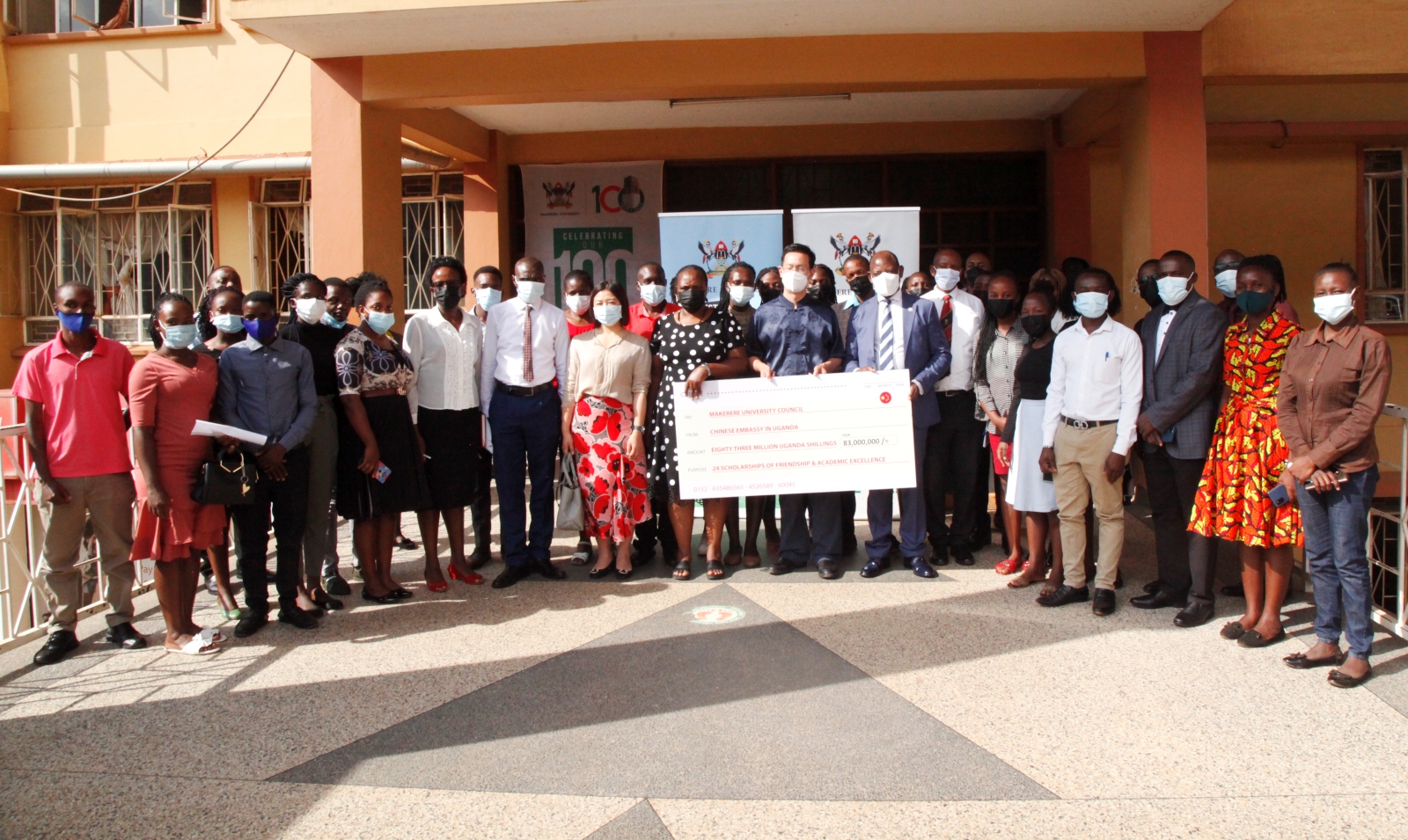
By Ritah Namisango
“When he entered the room, they looked at him with beaming smiles, an expression of the sincere gratitude deep within. A true friend, he was representing a generous People and Country that saved them from dropping out of Makerere University!”
That was the mood on Tuesday 26th July, 2022 when the Ambassador of the People’s Republic of China to Uganda, H.E. Zhang Lizhong entered the Tele-Presence Centre at the Senate Building to officiate at the Scholarship Award Ceremony.
A total of 24 Makerere University students who are academically gifted, but challenged with raising tuition and functional fees received financial support to continue and complete their studies courtesy of the Chinese Ambassador’s scholarship programme.
H.E. Zhang Lizhong presented the scholarship package worth UGX 83 million to Makerere University Vice Chancellor, Prof. Barnabas Nawangwe at a colourful award ceremony witnessed by the beneficiaries and invited guests.
The 24 scholarship recipients currently in their third year of study were identified and supported during the second year of study, following documented evidence that they had performed well in the first year of study, but were struggling with payment of tuition and functional fees to move on to the next level. The Chinese Ambassador’s scholarship programme is coordinated by the Makerere University Gender Mainstreaming Directorate (GMD).
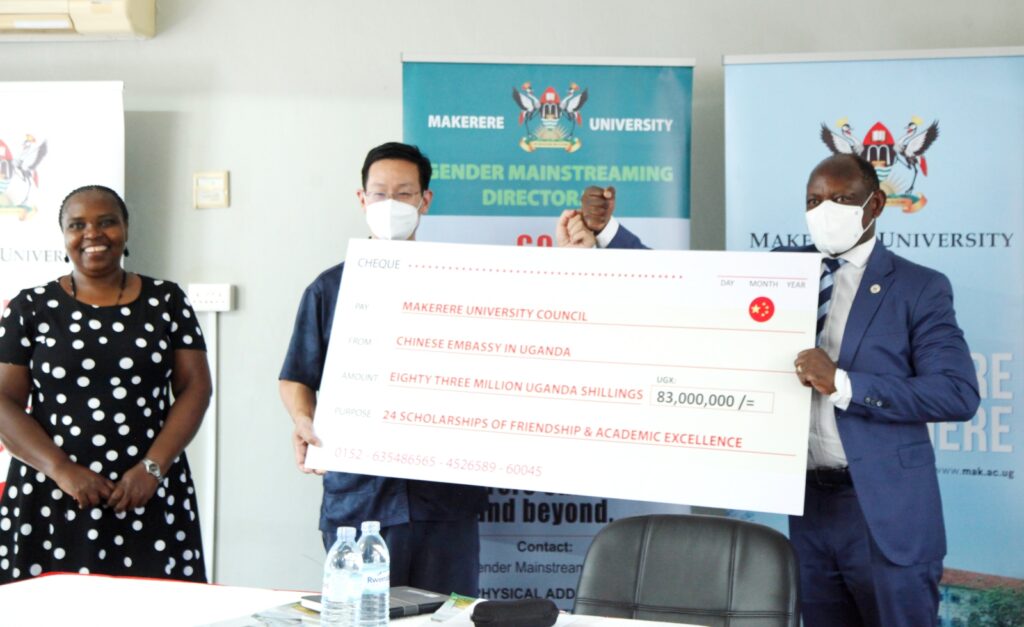
In her remarks, the Director GMD, Dr. Euzobia Mugisha Baine welcomed Ambassador Zhang Lizhong to Makerere University and commended him for continuity of the scholarship programme started by his predecessor. She thanked the Ambassador and the People’s Republic of China in general for the scholarship programme aimed at transforming lives of the scholars through provision of access to university education.
Providing an overview, Dr. Mugisha Baine pointed out that Makerere University signed the Chinese Ambassador’s scholarship contract in 2018 when the then Ambassador of the People’s Republic of China presented the scholarship programme as a sign of friendship and cooperation between the people of Uganda and China.
“In 2018, the Chinese Ambassador offered 30 scholarships to students who are academically talented, but economically disadvantaged to study at Makerere University. In 2020, the Chinese Embassy renewed this scholarship offer by supporting an additional 24 students with scholarships categorized into two – the Friendship Award and Excellence Award.
“To date, 54 scholarships have been awarded to students studying various programmes in the different Colleges at Makerere University. The first cohort started with the Academic year 2018/2019. Out of the 30 scholars in the first cohort, 26 had graduated as at May 2022. The second cohort of 2020/2021 are now in the third year of study and are 24,” highlighted Dr. Mugisha Baine.
She was happy to note that the scholars have continued to excel in their studies. “We are delighted that three (3) of the 26 graduates obtained first class degrees, fifteen (15) obtained second class upper degrees and the rest second class lower degrees. The remaining four (4) are pursuing programmes that are more than three (3) years and are expected to complete studies this semester.”
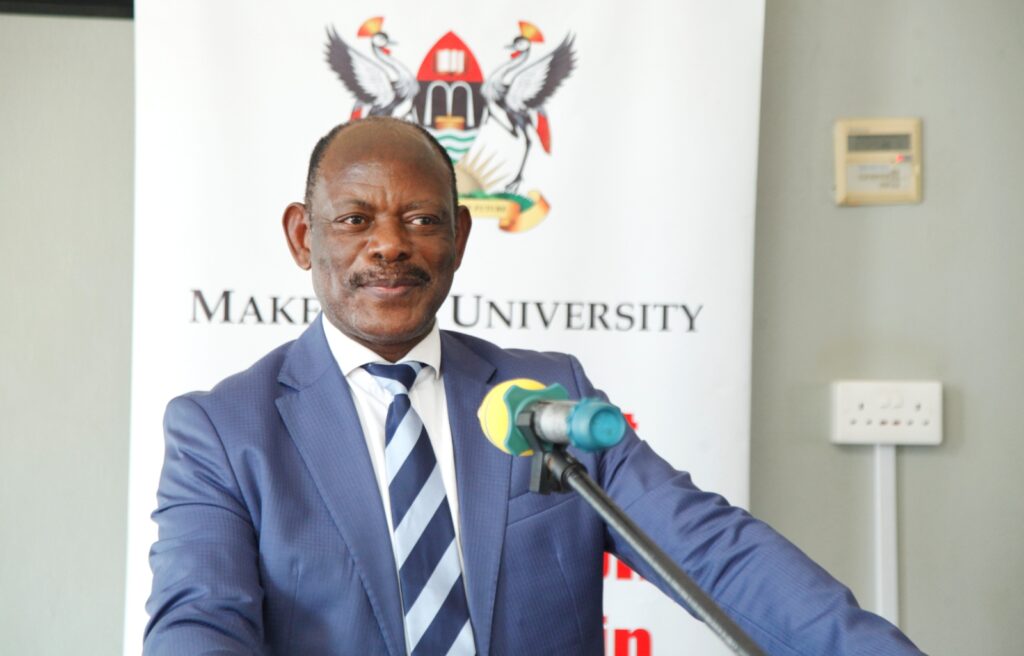
The Vice Chancellor, Prof. Nawangwe underscored the value of education by quoting a line from the speech delivered by President Nelson Mandela on 16th July 2003 at the launch of the Mindset Network in South Africa.
“Education is the great engine of personal development. It is through education that the daughter of a peasant can become a doctor, that the son of a mine worker can become the head of the mine; that a child of farm workers can become the president of a great nation.”
Nelson Mandela
Prof. Nawangwe informed the audience that although many people in Uganda value education, not everyone can access university education. He provided an account of telephone calls that he regularly receives from different parts of the globe requesting for scholarships to study at Makerere University. He also noted that every year, more than 1,000 students drop out of school due to lack of fees.
Based on this lived experience, Prof. Nawangwe saluted the Ambassador and People’s Republic of China for the generosity extended to students pursuing studies at Makerere University supported by the Chinese Ambassador’s scholarship programme.
Upholding the fact that there are many more students who would wish to receive such scholarships, the Vice Chancellor implored the lucky scholars to concentrate on their studies and use the knowledge acquired to contribute to the transformation of communities, Uganda and the world at large.
“Education will enable you to be a better person. Always remember that as a beneficiary under the Chinese Ambassador’s scholarship, you have a duty to create a positive change in your life, your families and communities. When you become a better person, we expect you to uplift your families and communities,” he said.
Prof. Nawangwe re-echoed to the students that Makerere University by virtue of a number of collaboration activities/programmes involving the Embassy of the People’s Republic of China, Chinese companies, the Confucius institute, and memoranda of understanding with universities in China accords them a number of golden opportunities to further their education.
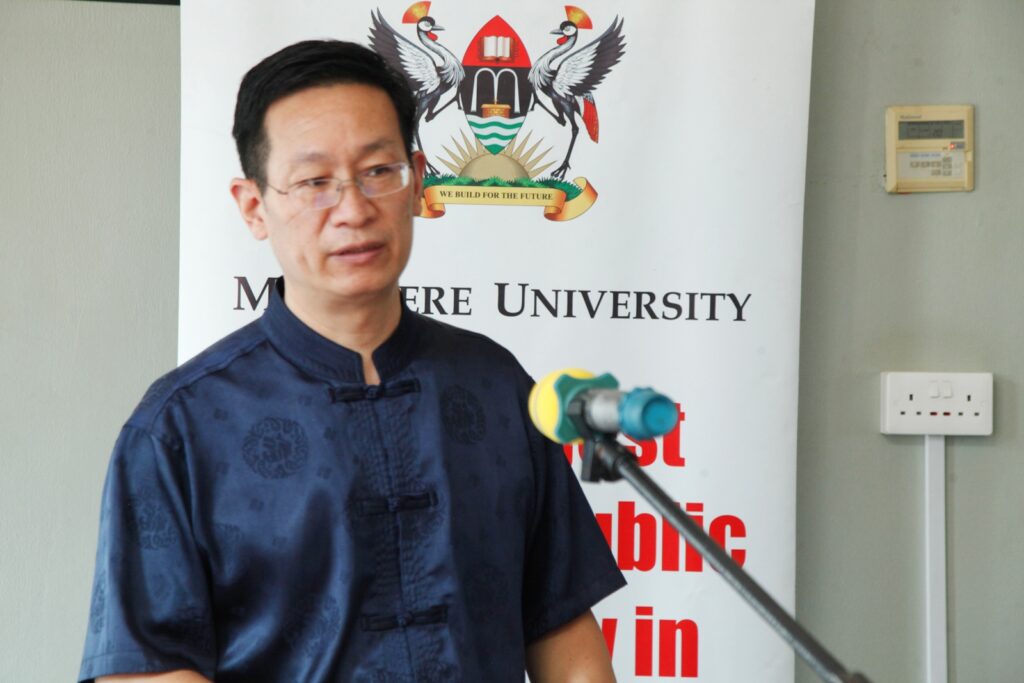
Presenting the dummy cheque worth UGX 83 million to the Vice Chancellor, H.E. Zhang Lizhong congratulated the scholars on being awarded the Chinese Ambassador’s scholarship for Excellence and Friendship. The Ambassador pointed that for five consecutive years, nearly 100 students have received financial support to fulfill their dreams through the Chinese Ambassador’s scholarship, with some graduates already active in all walks of life in Uganda. He thanked the Vice Chancellor and staff of Makerere University for promoting education and cooperation between Uganda and China.
H.E. Zhang Lizhong disclosed that people-to-people exchange is an important component of the China-Uganda Comprehensive Cooperative Partnership. He was therefore happy to witness the fruitful results brought by the cooperation in the education field among China, Makerere University and the Ministry of Education and Sports.
The Ambassador acknowledged the Confucius Institute at Makerere University for the instrumental role played in cementing the relationships at different levels and partnerships involving Uganda and China. The Confucius Institute has facilitated classes and cultural exchanges that have enabled many Ugandans to learn Chinese.
“The first phase of language training has been completed successfully and 100 Ugandan teachers for Chinese language are able to teach Mandarin in schools in Uganda, and the second phase of 500 is in good progress,” he highlighted. He also stated that for the past five years, China has provided 5,000 training opportunities and government scholarships to Ugandans.
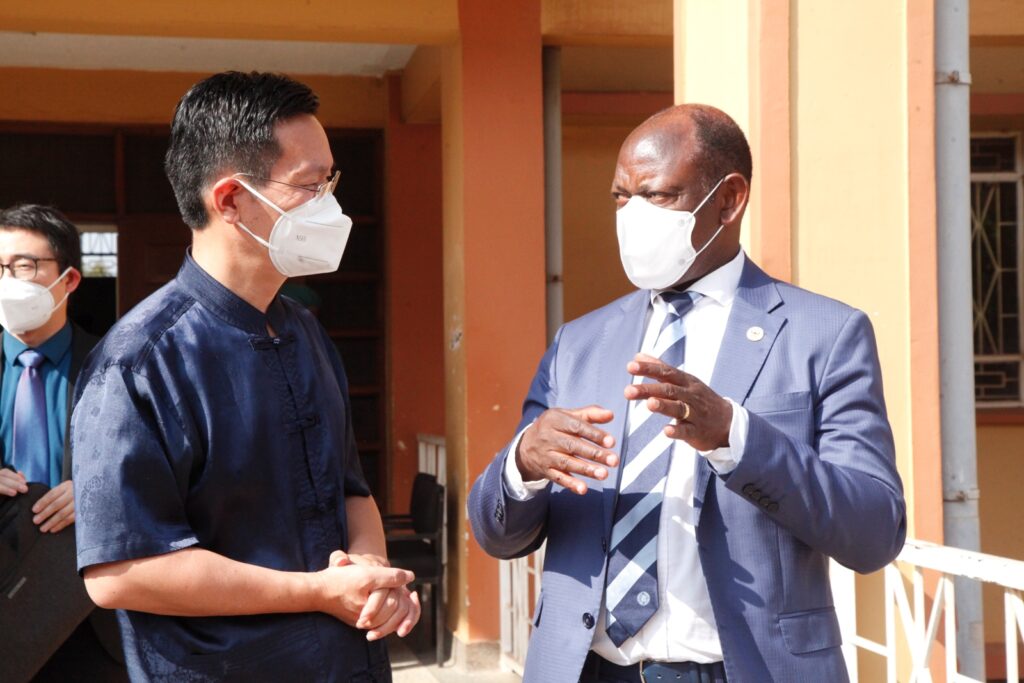
In line with the Ambassador’s address, the Director of the Confucius Institute at Makerere University, Dr. Gilbert Gumoshabe called upon the scholars to create time and participate in activities undertaken by the Institute. He also expressed readiness to work with the Gender Mainstreaming Directorate to come up with a schedule that would enable the scholars to learn the Chinese language and culture.
On behalf of the students, Ms. Daphne Naudho who is studying a Bachelor of Arts in Social Sciences profoundly thanked the Ambassador, the People’s Republic of China and Makerere University for according them the golden opportunity to complete their studies.
“Your generosity has inspired us to help others and give back to the community. Thank you for putting our feet on the path of true greatness and setting us on the path of true discovery,” remarked Naudo amidst applause from scholars.
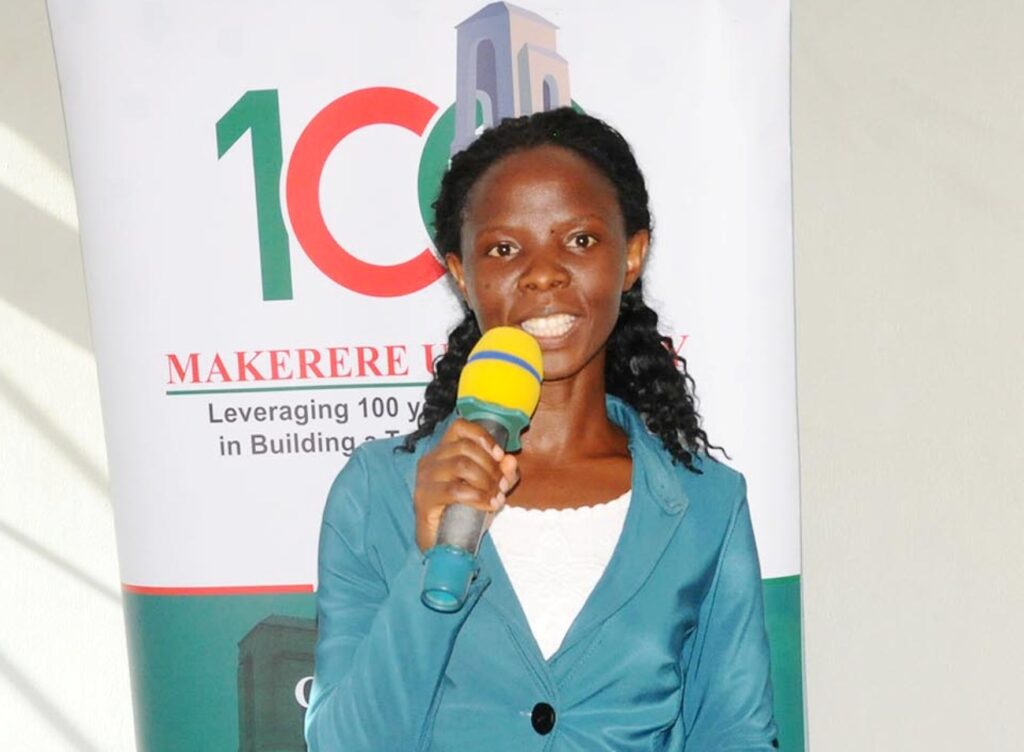
Ms. Ritah Namisango, the Principal Public Relations Officer of Makerere University moderated the Scholarship Award ceremony as well as discussions between the Ambassador, the Vice Chancellor, the Confucius Institute, staff, scholars and the media.
You may like
-


Mak Selected to Host Alliance for African Partnership Africa Office
-


Meet Najjuka Whitney, The Girl Who Missed Law and Found Her Voice
-


Makerere University School of Public Health Graduates First Cohort of Cost-Effectiveness Analysis Short Course
-


Climate variability found to shape malaria trends in Yumbe District
-


Mak hosts First African Symposium on Natural Capital Accounting and Climate-Sensitive Macroeconomic Modelling
-


Uganda Martyrs Namugongo Students Turn Organic Waste into Soap in an Innovative School Project on Sustainable Waste Management
General
Mak Selected to Host Alliance for African Partnership Africa Office
Published
12 hours agoon
February 23, 2026
Makerere University has been selected to host the Africa Office of the Alliance for African Partnership (AAP). The significant milestone that underscores Makerere’s role in fostering research, innovation, and global collaborations across the continent was announced at a meeting of the University’s Central Management with an AAP delegation on 23rd February 2026.
Makerere’s selection was based on the University’s robust commitment, alignment with the AAP’s Strategic Plan, and proven ability to manage consortium activities. The AAP, which was initiated by Michigan State University (MSU) in collaboration with Ten African Universities and agricultural policy research networks in 2016, targets critical challenges in education, youth empowerment, health and nutrition, agri-food systems, science and technology, water, energy, environment, and culture and society.
Addressing the delegation consisting of AAP Co-Directors from MSU, Dr. Jose Jackson-Malete and Dr. Amy Jamison, accompanied by newly-appointed Director of the AAP Africa Office, Dr. Racheal Ddungu Mugabi and Ms. Clare Cheromoi, the Vice Chancellor, Prof. Barnabas Nawangwe who appreciated the choice of Makerere to host the Africa Office said:
“One of the greatest challenges facing African universities is PhD training, particularly supervisory capacity. Through partnerships such as the Alliance for African Partnership we can leverage international expertise to strengthen supervision—whether through training supervisors or through joint supervision arrangements.”
Prof. Nawangwe equally applauded joint initiatives such as the Grant Writing and Publication project, which gave rise to the establishment of a Writing Centre that he said can be used to build capacity in AAP member universities with Makerere as the hub. Officially launched on 21st March 2023, the project is living up to its expectation of becoming a springboard for strong postdoctoral collaborative research for both institutions and other US universities.
Dr. Titus Awokuse, Vice Provost and Dean for International Studies and Programs at Michigan State University (MSU) who attended virtually, reiterated that Makerere’s selection reflects its long-standing commitment to advancing African higher education, research excellence, and meaningful global collaboration.
Reflecting on the origins of the Alliance for African Partnerships (AAP), Dr. Awokuse explained that nearly a decade ago, MSU initiated a transformative conversation in Atlanta centered on the question: How should we partner differently? From this dialogue emerged AAP—an Africa-centered consortium that now brings together 12 institutions across Africa and the United States.

He emphasized that AAP is grounded in equity, mutual benefit, shared leadership, and deep respect for African priorities and expertise. Since its founding, MSU has served as convener and key supporter, working with member institutions to strengthen research collaboration, promote faculty and student engagement, and address shared development priorities.
Dr. Awokuse underscored that AAP’s success is the result of collective vision and commitment, not the efforts of a single institution. He paid tribute to Lilongwe University of Agriculture and Natural Resources for hosting the Africa Office in its early years and acknowledged the foundational leadership of the inaugural Africa Office Director.
He described the launch of the Africa Office at Makerere University as a significant milestone that reinforces Africa-led leadership, strengthens regional collaboration, and enhances responsiveness to emerging opportunities. MSU, he affirmed, remains fully committed to AAP and to working closely with Makerere and all consortium partners to expand collaborative research, nurture the next generation of scholars, and advance Africa-led solutions to global challenges.
The newly-appointed AAP Africa Office Director, Dr. Racheal Ddungu Mugabi is a member of faculty in the Department of Development Studies, Institute of Gender and Development Studies. Her work on intersectional inequalities in Uganda and other Global South regions uniquely positions her to drive collaborative research and partnerships at the Africa Office.
Initially founded by ten African Universities and MSU, AAP now comprises eleven African members including; the African Network of Agricultural Policy Institutes (ANAPRI)-Zambia, Egerton University-Kenya, Lilongwe University of Agriculture and Natural Resources (LUANAR)-Malawi, Makerere University-Uganda, United States International University-Africa-Kenya, Universite Cheikh Anta Diop-Senegal, Universite Yambo Ouologuem de Bamako-Mali, University of Botswana-Botswana, University of Dar es Salaam-Tanzania, University of Nigeria, Nsukka-Nigeria, and the latest, University of Pretoria-South Africa.
These Universites collaborate under Focal Points to advance policy-relevant research and sustainable development. Makerere University’s Focal Point is Prof. Robert Wamala, Director of Research, Innovations and Partnerships (DRIP).
Addressing the University Management, Dr. Jackson-Malete outlined the African Futures Research Leadership Program, which nurtures early career scholars through mentorship and skill-building as one of AAP’s flagship programs. She noted that the Program that prioritizes female participants or men committed to promoting women in higher education has for the first time during its fifth cohort admitted the first male, Dr. Alfadaniels Mabingo from the Department of Performing Arts and Film, Makerere University.
The AAP Africa Office at Makerere will coordinate activities, boost research collaboration, mobilize resources, and enhance global engagements for socio-economic transformation. This aligns with Makerere‘s broader goals of leveraging international expertise to build resilient institutions.
View more photos from the event: https://flic.kr/s/aHBqjCLjoA
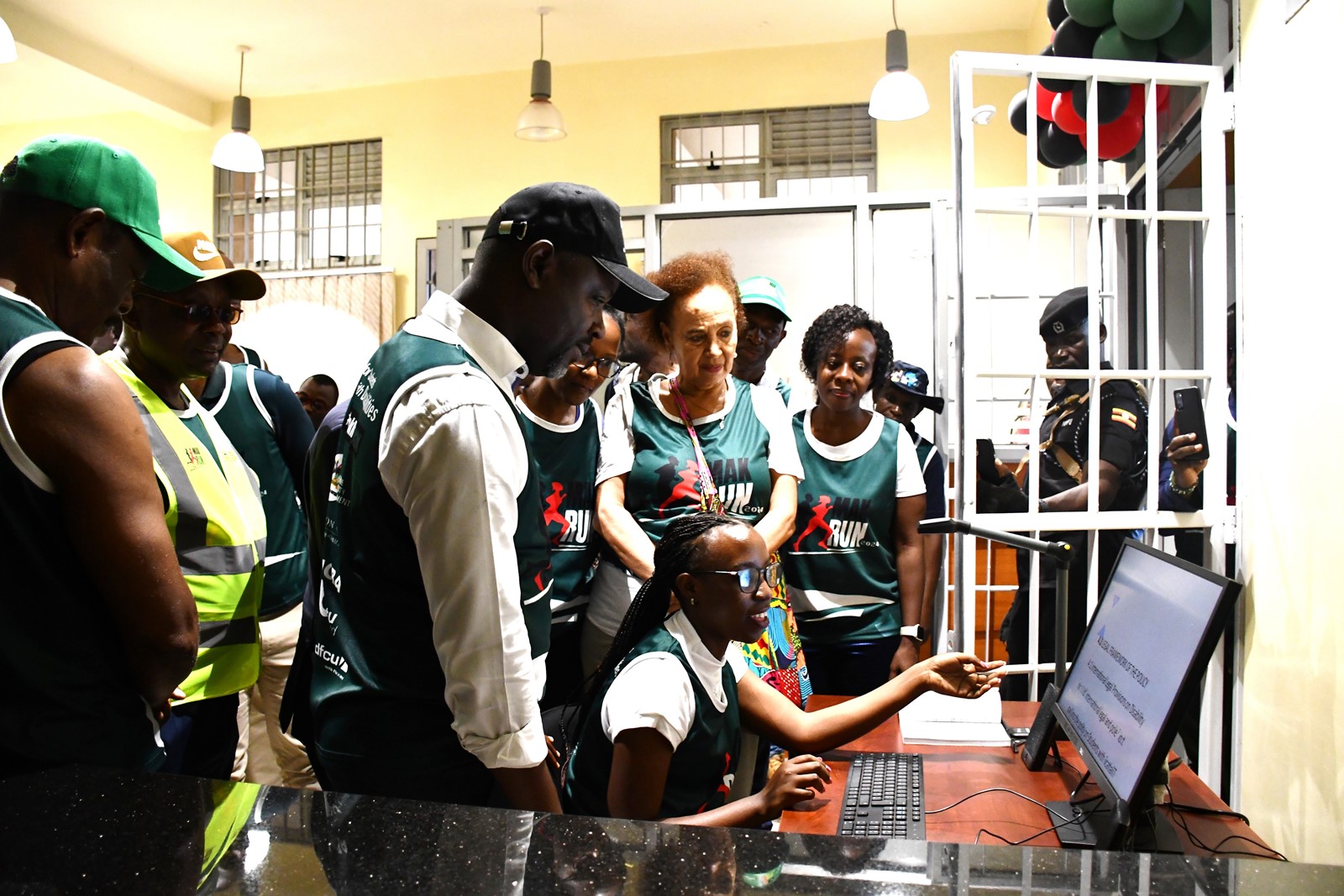
Students with disabilities at Makerere University have been requested to stop seeking for special attention and instead look for solutions and opportunities for personal growth.
This was during a mental wellness, inclusion and safeguarding session organized by the Dean of Students office and the Mastercard Foundation Scholars Program at Makerere University.
Addressing students on mental health and disability inclusion, Mr. Marvin Ggaliwango, a lecturer at the College of Computing and Information Sciences (CoCIS), noted that if the students stop complaining, they will become empowered to take charge of their own development, build resilience and engage confidently in both academic and social environments.
“Turn your lived experiences into tools for innovation. Stop complaining and start creating solutions for yourselves. You are the one living this life, and that gives you the authority to be an expert. When you develop a solution, it doesn’t just benefit you, it helps others too, by removing barriers,” Mr. Marvin Ggaliwango, said.
He encouraged students to see themselves not as victims of circumstance, but as active participants and co-creators of the inclusive environment they wish to experience.
“Learn how to communicate effectively and humbly. If you have a problem, express yourself clearly. Do not isolate yourself or feel resentful. You are not defined by disability, you may face disadvantages, but you still have ability,” he encouraged.
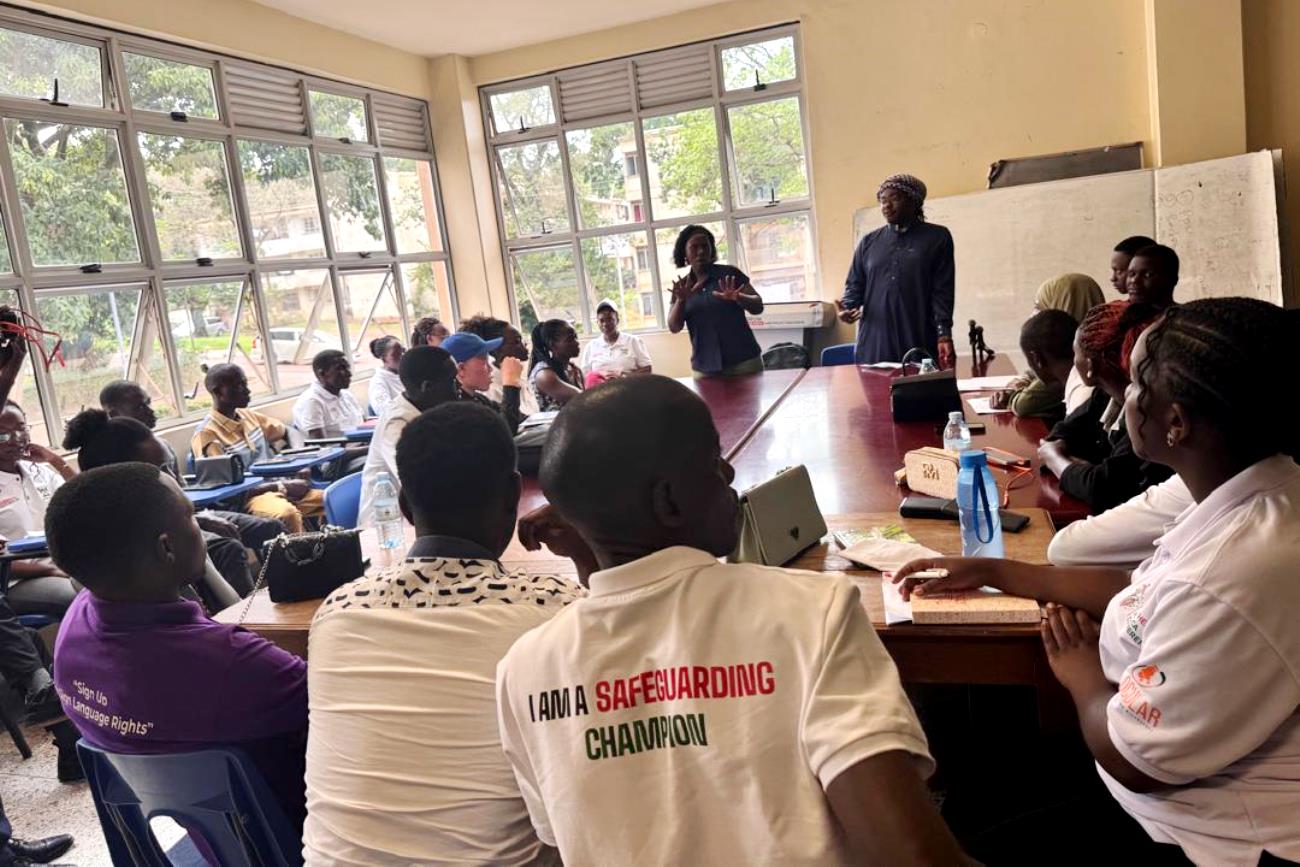
Throughout the session, students listened attentively as he emphasized the importance of self-awareness and personal responsibility, urging them to understand their strengths, acknowledge their limitations and take deliberate steps toward personal growth while contributing positively to the University community.
“We must enhance and ensure that our mental health is number one. Always choose yourself first. Choose what makes you happy and protect your peace. If you are at peace with yourself, your academics will improve. There is a strong link between mental wellness and academic success,” Mr. Ggaliwango, noted.
In his speech, Mr. Musa Mwambu, the Disability Inclusion Advisor at Light for the World Uganda, called upon the students with disabilities to enhance and ensure that their mental health is prioritized.
“As students living with disabilities, sometimes you over expect, because you have a disability you should be given, listened to and when people do not listen to you, you attribute it to your disability, get it from me, even those without disabilities are not listened too. Things are not happening to you because of your disability it is because of the world we live in. Everything that happens to you can happen to others,” Mr Mwambu, noted.
“Have fun with your life. Make yourself happy and be smart. Present yourself in public confidently wherever you go. The way you carry yourself can improve your mental health and how others perceive you,” Mr. Mwambu said.
He reminded the students that gaining admission to Makerere is itself a milestone.
“There are many people without disabilities who have never stepped at Makerere University. Find something that empowers you and hold on to it. You may have a physical impairment, but if you are brilliant in class, you can lead discussions and inspire others,” he added.

During the session, Dr. Rodney Rugyema, the Acting Principal Warden, welcomed the students back from the long holiday. He assured them that the University is committed to their safety and well-being while on campus.
Dr. Rugyema emphasized that the University has systems in place to protect students, both physically and psychologically and encouraged them to report any concerns promptly.
“When you are at the University, you are not on your own, we are always here for you. For us to engage you on mental wellness and inclusion, we want you to be in the right state of mind, whole and complete,” Dr Rugyema, said.
He added: “We are here to empower you and we are calling upon you not be a risk for yourself and always be able to detect risks that are likely to affect your mental health and works towards avoiding them and reporting them to ensure that the University manages them before they escalate into real harm whose impact is more serious than you can think,”
During the session, Ms. Diane Nabikolo Osiru highlighted the University’s broader commitment to safeguarding.
Safeguarding at Makerere University refers to measures put in place to promote safety and wellness of all students, staffs and other stakeholders.
“At Makerere University, safety is not a luxury for few. but it is a right for every student. As the semesters begins, we are urging you to learn how to identify signs of harm or abuses and report them to the appropriate safeguarding contact points,” Ms Nabikolo, said.
For support in case of any harm or abuse, International and Refugee Students, can access support through the Advancement and International Office, while Students with Disabilities, can utilize the Disability Support Center. Those with personal and emotional challenges, can visit the Counselling and Guidance Centre.
In his speech, Dr Joab Agaba, a Lecturer in the College of Computing and Information Sciences, guided students how to report risks and incidences to the MakSafeSpace, the e-reporting platform complimenting the other University traditional reporting channels.
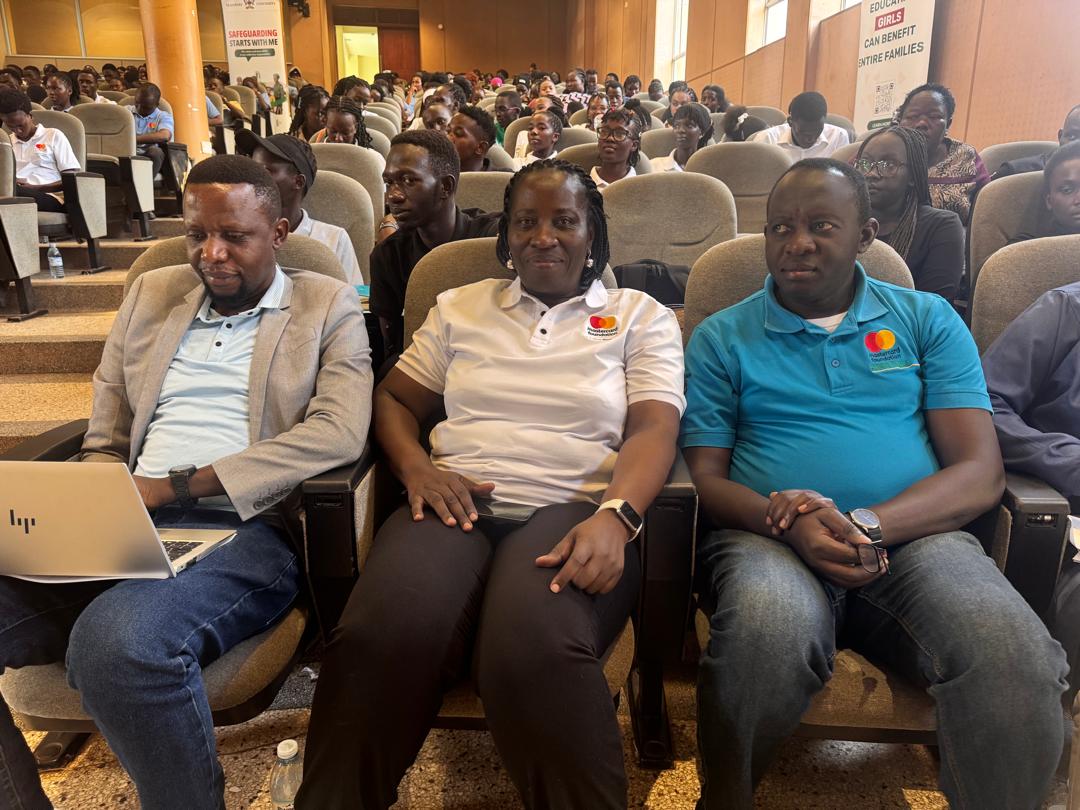
Mr. Henry Nsubuga, the Manager of the Counselling and Guidance Center, shared practical strategies for coping with stress effectively including time management, setting realistic goals, seeking support from peers or counsellors.
Students speak out
Shanitah Nahamya, 2nd year student of the Bachelor of Adult and Community Education
“I have learned how to respectfully and appropriately engage with students with disabilities. In the past, I often felt pity when I encountered them, but now I understand that what they need is not pity, it is respect, support, and equal opportunity.”
Guo Dorothy Geri, 1st year student of the Bachelor of Commerce
“I have learnt how to use inclusive language. Before offering help to a student with a disability, I will first ask them, because not all the time do they need our help. You might think someone wants to be helped to cross the road, yet they are waiting for someone.”
Valentines Doris Aduka, 1st Year student of the Bachelor of Biomedical Science
“I have been calling students with disabilities special names, thinking it was kind. But I have learned that they do not want to be treated differently or labeled in a special way. What they value most is being treated like everyone else, with respect, dignity, and fairness.”
General
Strengthening Global Partnerships to Advance Research, Innovation, and Graduate Training: Makerere University Hosts Delegation from the University of Warwick
Published
5 days agoon
February 19, 2026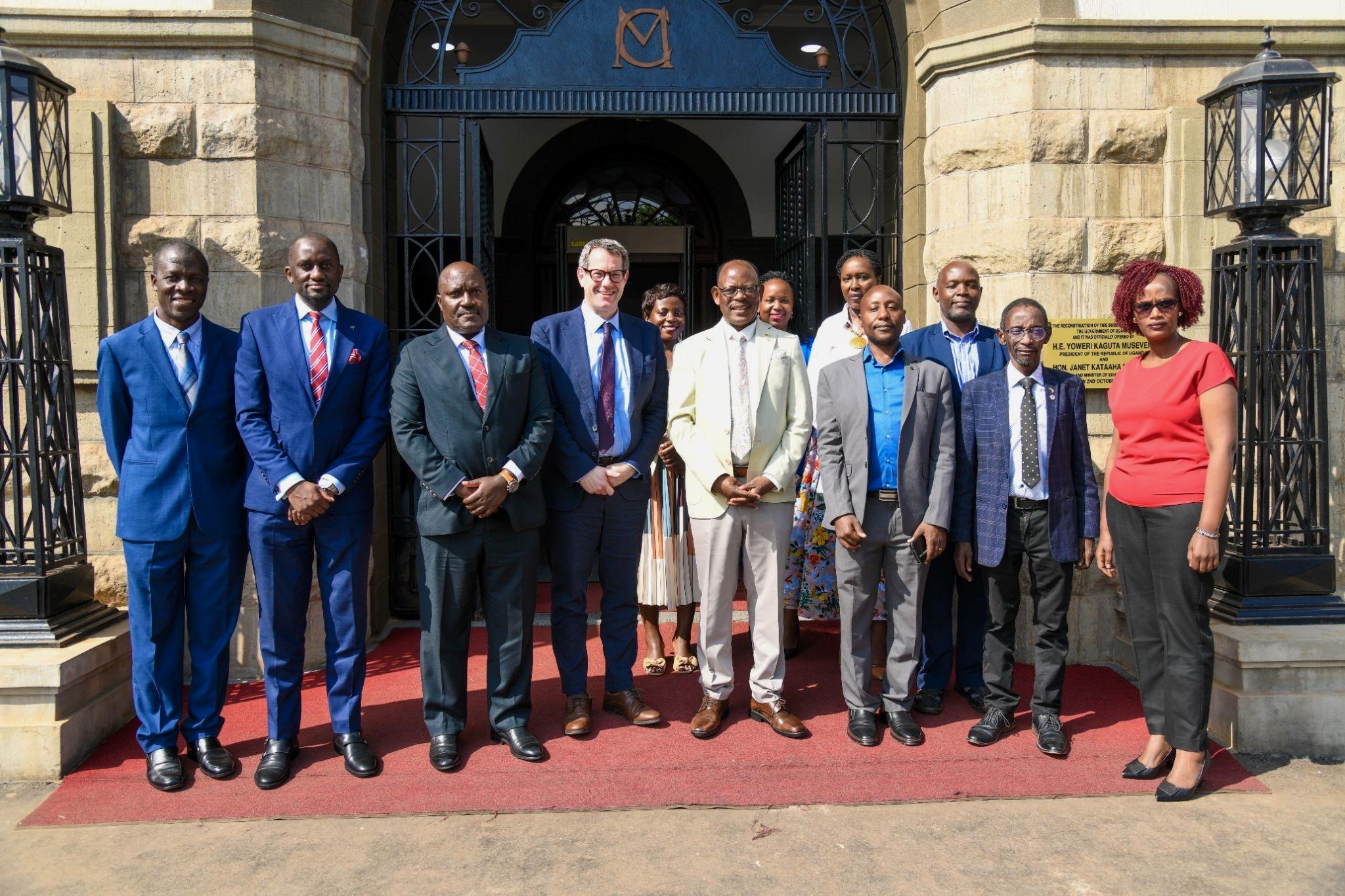
Makerere University continues to deepen its global engagement agenda through strategic partnerships that enhance research, innovation, and graduate training. On Friday, 13th February, 2025, during a recent engagement with a delegation from the University of Warwick (UK), university leaders, researchers, and administrators explored potential collaborations to address pressing development challenges and strengthen institutional capacity.
Expanding Collaboration in Research and Innovation
Welcoming the delegation, Prof. Fred Masagazi-Masaazi, Chairperson of the Makerere University Research and Innovations Fund (Mak-RIF) Grants Management Committee, emphasized the growing dialogue between Makerere University and the University of Warwick. He noted that ongoing discussions are focused on resource mobilization to support research and innovation, as well as building sustainable academic exchanges for both staff and students.
Dr. Roy Mayega, Mak-RIF Coordinator, together with Mrs. Phoebe Lutaaya Kamya, Deputy Coordinator, and members of the Mak-RIF team, highlighted the Fund’s role in catalyzing collaborative research and strengthening partnerships that translate research into societal impact.
Mr. Simon Kizito, Deputy University Secretary, outlined key areas identified for collaboration, including joint research and innovation initiatives, benchmarking visits across disciplines such as law, science, and ICT, and student exchanges designed to strengthen applied research skills. He also pointed to opportunities for training Makerere staff in specialized areas such as tropical diseases and innovation ecosystems, drawing lessons from Warwick’s strong linkages with industry partners located within its campus.
Makerere’s Strategic Priorities and Global Role
In his remarks, the Vice Chancellor underscored the longstanding relationship between Makerere University and the University of Warwick, dating back to the early 1980s, initially through staff training and more recently through collaborative research.
He highlighted Makerere’s historic contribution to leadership development across Africa and beyond, and the University’s continued growth following faculty rebuilding efforts in the 1980s, which have strengthened its research capacity. Today, Makerere has over 1,300 academic staff, more than 1,000 of whom hold PhDs, positioning the institution to play a leading role in knowledge production.
The Vice Chancellor also outlined major thematic areas where partnerships are critical:
- Climate change and food security: Researchers at the College of Agricultural and Environmental Sciences (CAES) are developing drought-resistant and high-yield seed varieties to address changing weather patterns and food insecurity.
- Public health and infectious diseases: Uganda faces frequent outbreaks of diseases such as Ebola and Marburg, and Makerere has built strong capacity in outbreak response and tropical medicine. The University’s medical school and the Infectious Diseases Institute (IDI) continue to play a pivotal role in research and treatment.
- Peace and conflict studies: Through initiatives such as the Rotary Peace Centre, Makerere contributes to training global leaders in conflict resolution.
- Climate-sensitive macroeconomic modelling: Makerere recently hosted a conference in collaboration with the Ministry of Finance, Planning and Economic Development to advocate for climate-responsive macroeconomic modelling and to plan for the establishment of a Centre of Excellence in this field.
- Innovation and technology: The University’s innovation ecosystem has produced notable outputs, including Africa’s first electric vehicle and ongoing work to expand incubation facilities to enable students to graduate with viable enterprises.
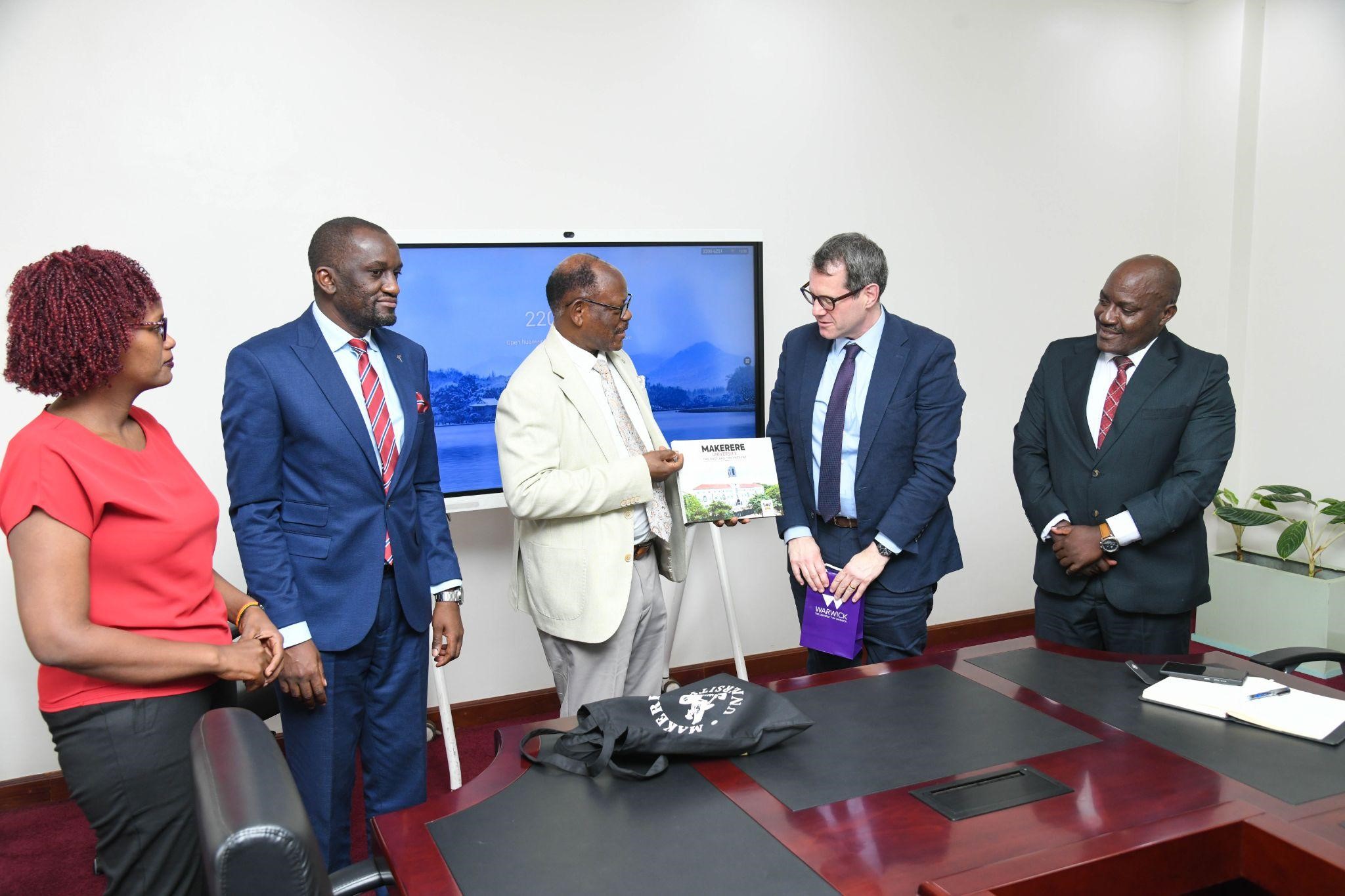
The Vice Chancellor emphasized that addressing youth unemployment remains a central priority, noting that innovation, entrepreneurship, and graduate training are essential to building stable societies.
He further stressed the importance of expanding graduate education. Africa currently produces a small proportion of global research output, and increasing PhD and Master’s training supported by international partnerships remains critical to accelerating knowledge production and development outcomes.
Internationalization and Shared Learning
Speaking on behalf of the University of Warwick, Professor Daniel Branch, Deputy Vice Chancellor, reflected on Warwick’s own institutional journey, noting that its growth has been driven by a strong focus on internationalization, innovation, and research. He expressed Warwick’s commitment to building productive partnerships with African universities, including Makerere, to advance joint research, training, and innovation.
Professor Branch also highlighted the importance of university-industry linkages, citing examples such as collaborations with major manufacturing firms that provide practical training opportunities and inform curriculum development.
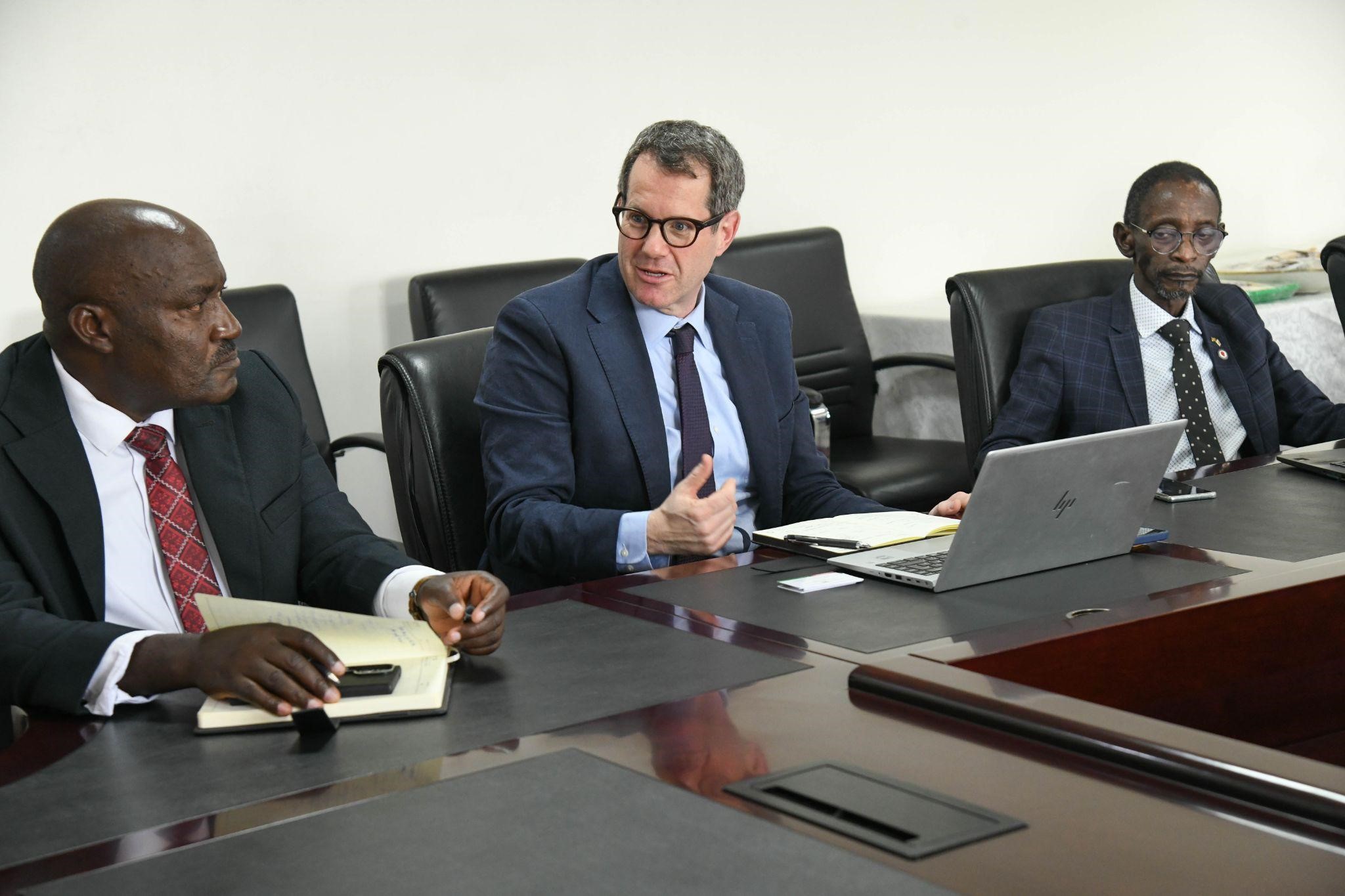
Showcasing Research and Innovation at CEDAT
A second session of the engagement was held at the College of Engineering, Design, Art and Technology (CEDAT), where academic leaders and researchers presented ongoing work across multiple disciplines.
Presentations included:
- Development of a solar water pump through reverse engineering (Dr. Edmund Tumusiime)
- Crane Cloud, a locally developed cloud-computing platform (team from the College of Computing and Information Sciences)
- Profiling gaseous emissions associated with burnt bricks (Dr. Nathan)
- Integration of centralized grid and decentralized renewable off-grid systems: a techno-economic analysis (Dr. Abubaker Waswa)
- Innovation and digitalization pathways for affordable housing in Sub-Saharan Africa (Prof. Stephen Mukiibi)
The session was attended by CEDAT leadership, including the Principal, Prof. Moses Musinguzi, as well as deans and heads of department from engineering, built environment, and industrial and fine arts. The day’s activities were concluded with a tour of Makerere University’s Innovation Hub.
The engagement reaffirmed Makerere University’s commitment to building strong, mutually beneficial partnerships that accelerate research, strengthen graduate training, and drive innovation. As global challenges such as climate change, public health threats, and youth unemployment intensify, collaboration among universities remains essential to developing scalable, evidence-based solutions.
Through partnerships such as the one Makerere University and the University of Warwick hope to activate through a Memorandum of Understanding in the near future, Makerere continues to position itself as a leading research-intensive university dedicated to transforming society through knowledge, innovation, and global cooperation.
Caroline Kainomugisha is the Communications Officer, Advancement Office, Makerere University.
Trending
-

 General2 weeks ago
General2 weeks agoAptitude Exam (Paper 1) Results for the Mature Age Entry Scheme 2026/2027
-

 Health5 days ago
Health5 days agoUganda has until 2030 to end Open Defecation as Ntaro’s PhD Examines Kabale’s Progress
-

 General5 days ago
General5 days agoMastercard Foundation Scholars embrace and honour their rich cultural diversity
-

 General2 weeks ago
General2 weeks agoFor Youth by Youth – Call for Second Cohort Applications
-

 Agriculture & Environment4 days ago
Agriculture & Environment4 days agoUganda Martyrs Namugongo Students Turn Organic Waste into Soap in an Innovative School Project on Sustainable Waste Management
